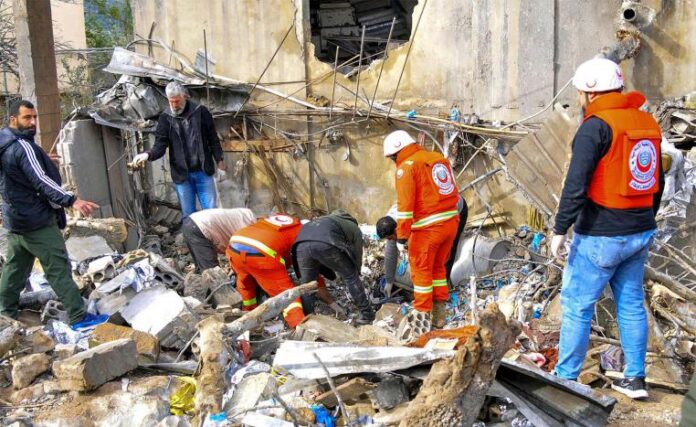A tragic incident unfolded in Gaza’s northern town of Beit Lahiya early Tuesday as an Israeli airstrike targeted a five-story building sheltering displaced Palestinian families. The Gaza Health Ministry reported at least 60 fatalities, with over half being women and children, including infants. The strike, part of Israel’s ongoing operations in northern Gaza, has led to immense distress, stretching local healthcare resources beyond capacity. Kamal Adwan Hospital, situated near the attack site, received a wave of severely wounded victims. The hospital had recently been raided by Israeli forces, who detained dozens of medics and reportedly apprehended suspected Hamas operatives.
In a parallel development, Hezbollah, the Lebanese militant group, announced Sheikh Naim Kassem as its new leader, succeeding the late Hassan Nasrallah, who was killed in an Israeli airstrike last month. Sheikh Kassem, a founding member of Hezbollah and Nasrallah’s long-standing deputy, has now taken up leadership. In recent televised messages, Kassem affirmed that Hezbollah would continue on its path, calling for ongoing resistance and promising to fulfill Nasrallah’s vision. Hezbollah has launched several rocket attacks on northern Israel following Hamas’ attack from Gaza on October 7, which ignited the current wave of violence in the region.
International aid groups are expressing growing alarm over Israel’s intensified restrictions on humanitarian access. The recent airstrike on the shelter in Beit Lahiya has placed additional strain on Gaza’s collapsing healthcare infrastructure. Dr. Hossam Abu Safiya, who oversees Kamal Adwan Hospital, reported that the hospital is overwhelmed by casualties and unable to provide adequate care due to supply shortages and facility limitations. Dr. Marwan al-Hams, director of field hospitals in Gaza, confirmed that among the deceased were 12 women and 20 children, with many more still missing under the rubble.
Adding to the pressure, Israel’s parliament recently passed new legislation aimed at restricting the United Nations Relief and Works Agency (UNRWA), which is the primary aid organization serving Palestinian refugees in Gaza and the West Bank. UNRWA has long been the largest aid provider in Gaza, offering food, healthcare, and educational services to millions of Palestinians. The newly enacted laws ban UNRWA from operating on Israeli soil, raising concerns about the organization’s future ability to assist the nearly 2 million displaced people in Gaza. Critics argue that Israel’s restrictions may risk depriving vulnerable civilians of essential support, leading to a “collapse” of humanitarian aid, as described by UNICEF.
Hezbollah’s leadership transition comes amidst mounting regional tensions. In response to Hamas’ initial attack on Israel, Hezbollah began firing rockets from Lebanon into northern Israel, resulting in reciprocal airstrikes and escalating violence. Iran, a major supporter of Hezbollah and Hamas, has expressed backing for both groups. With Kassem now officially leading Hezbollah, the group has pledged to persevere in its objectives, despite the high-profile losses of senior commanders in recent Israeli raids. Hezbollah’s statement condemned Israel’s actions in Lebanon and affirmed the organization’s dedication to “victory.”
The ongoing conflict has led to large-scale displacement within Gaza, where approximately 90% of the 2.3 million residents have been forced to leave their homes, often relocating multiple times. The latest airstrikes targeting refugee camps in Jabaliya have further intensified the mass exodus, adding to the already critical humanitarian situation. Aid organizations fear that the recent legislation against UNRWA could hinder critical relief efforts and jeopardize essential services such as vaccinations, food distribution, and access to clean water for Gaza’s displaced population.
In a direct warning, the United States has urged Israel to allow greater humanitarian access, cautioning that failure to do so could result in reduced international support. Israel maintains that its actions are targeted at neutralizing Hamas militants within the civilian population. However, aid agencies argue that the frequent attacks on shelters and the denial of UNRWA’s resources jeopardize innocent lives, disproportionately impacting women and children.
This tragic episode marks another chapter in the escalating conflict, with Hezbollah’s new leadership vowing continued resistance and Israel pressing forward with its northern Gaza operations. The humanitarian community remains gravely concerned about the long-term impacts on Gaza’s civilians, who are bearing the brunt of a crisis with no end in sight.


